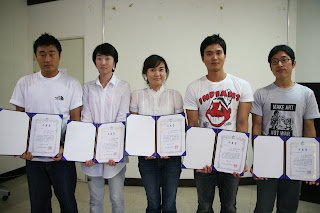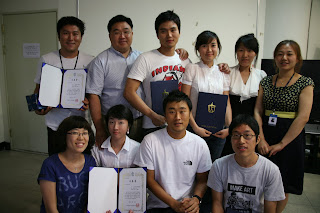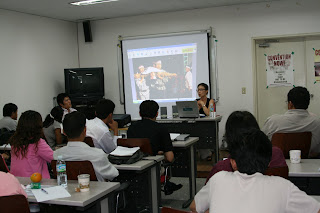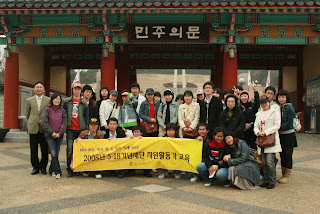On August 2008, 7 intern volunteers from USA came back to Gwangju, South Korea. The USA intern volunteers made their presentation on last September 26, 2008. The program started at 4.30 PM. The chairman, Mr. Yun Kwang Gwan gave his opening remarks.

Below was the order of presentation:
1. Ryu Jei Jun / Korean American Resource and Cultural Center
2. Park Hun Mo / Korean American Resource and Cultural Center
3. Yang In Hwa / Rainbow Center, Inc
4. Kim Seng / Rainbow Center, Inc
5. Kim Ha Na / Rainbow Center, Inc
6. Yim Kwang Jun / Korean Resource Center
7. Chui Ha Na / Korean Resource Center
Some family members, parents, siblings of intern volunteers came and gave support to their children’s presentation. The parents were very proud with their children and the support from the parent is important.
Yang In Hwa, the youngest intern volunteers in USA. She was just 21 years old when she became an intern at Rainbow Center, USA. For her, the internship program was a step for her growing up. First time she arrived at Rainbow Center, she felt inept. Time goes by and after 2 weeks, she felt like real member and enjoyed her time. In her internship program, she saw and was touched with the struggle and sacrifices of some people who shared with the others who are in need of help.
The Sisters would cook for us rather than themselves, the participants in the alteration and tailoring class took turns preparing snacks for the class and sharing them together, and other good examples. She was surprised when seeing Korean Americans who were, themselves struggling to make a living in a foreign land, support, and make donations to share with other Korean Americans who are less fortunate. She considers it as a precious time being an intern at the Rainbow Center. She learned to be a person who can share her time and energy like other volunteers does.
Kyung Choi was an intern also at Rainbow Center. On September 4, 2007 it was a historical day for her. At that day, Rainbow Center held a documentary film screening. She watched the movies “And Thereafter” and “Me and Owl”. First movie was a story about a Korean military bride, and the second story was about an American military camp town sex-workers in Korea. Before she watched the 2 movies her premise was help interracially married Korean women in crisis at Rainbow Center, but it changed. Two weeks as an intern, she did not know what to do and learn. Little by little, she felt and learn precious things.
The internship program changed the opinion and thinking patterns of most of the volunteers in Asia and USA. It is a good program for the students and youth to see and feel life in other country which is different culture from theirs. As interns, they work at the NGO who serve for other people who need their love and care.
This year, there were 5 volunteers sent to USA. We hope that their internship will also create an impact in their lives to become better person.

link:
http://www.518.org/
1. Ryu Jei Jun / Korean American Resource and Cultural Center
2. Park Hun Mo / Korean American Resource and Cultural Center
3. Yang In Hwa / Rainbow Center, Inc
4. Kim Seng / Rainbow Center, Inc
5. Kim Ha Na / Rainbow Center, Inc
6. Yim Kwang Jun / Korean Resource Center
7. Chui Ha Na / Korean Resource Center
Some family members, parents, siblings of intern volunteers came and gave support to their children’s presentation. The parents were very proud with their children and the support from the parent is important.
Yang In Hwa, the youngest intern volunteers in USA. She was just 21 years old when she became an intern at Rainbow Center, USA. For her, the internship program was a step for her growing up. First time she arrived at Rainbow Center, she felt inept. Time goes by and after 2 weeks, she felt like real member and enjoyed her time. In her internship program, she saw and was touched with the struggle and sacrifices of some people who shared with the others who are in need of help.
The Sisters would cook for us rather than themselves, the participants in the alteration and tailoring class took turns preparing snacks for the class and sharing them together, and other good examples. She was surprised when seeing Korean Americans who were, themselves struggling to make a living in a foreign land, support, and make donations to share with other Korean Americans who are less fortunate. She considers it as a precious time being an intern at the Rainbow Center. She learned to be a person who can share her time and energy like other volunteers does.
Kyung Choi was an intern also at Rainbow Center. On September 4, 2007 it was a historical day for her. At that day, Rainbow Center held a documentary film screening. She watched the movies “And Thereafter” and “Me and Owl”. First movie was a story about a Korean military bride, and the second story was about an American military camp town sex-workers in Korea. Before she watched the 2 movies her premise was help interracially married Korean women in crisis at Rainbow Center, but it changed. Two weeks as an intern, she did not know what to do and learn. Little by little, she felt and learn precious things.
The internship program changed the opinion and thinking patterns of most of the volunteers in Asia and USA. It is a good program for the students and youth to see and feel life in other country which is different culture from theirs. As interns, they work at the NGO who serve for other people who need their love and care.
This year, there were 5 volunteers sent to USA. We hope that their internship will also create an impact in their lives to become better person.

link:
http://www.518.org/




























































